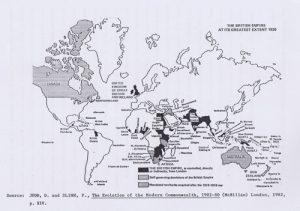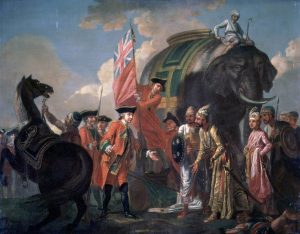American Anti-Colonialism, and the Liquidation of the British Empire.
The implication of this was that she became more dependent than most states on the maintenance of world peace simply for her own livelihood and a retention of a high standard of living. “Bonds of tradition, sympathy and interest linked her with other peoples all over the world, in the Pacific, Atlantic and Mediterranean, in Africa, Asia, America and Australia. These bonds at their closest took the form of a common allegiance to the Crown; these scattered peoples had the same principles of law and traditions of government and used the same language. In Europe and in the Middle East Britain had other traditional ties, resulting from friendship and strategic needs.”11
British Power
The United Kingdom’s imperial power throughout most of the nineteenth century and until the mid-twentieth century, as I have shown, relied upon the Royal Navy (with strategic bases), as well as territories providing extensive resources and a large population to exploit; but its essence was firstly trade and secondly investment. As a result of being the first industrial country, Britain became the trading giant, for whom the whole world was considered an outlet. The home or colonial markets were not the only markets that traders considered for selling the manufactured goods. Selling went far beyond these places. The factories in the United Kingdom could produce goods to saturate the home and colonial markets without any difficulty and still have plenty of iron and steel products for export to America and Europe and cheap textiles that could compete more than favourably with Indian home wares. This goes back to the first half of the nineteenth century when the parliament in Britain increasingly adopted the free trade ideas of Adam Smith which meant accepting the approach that restrictive trading barriers should be broken down in favour of one open international trading unit where trade goods could move freely for sale in the most suitable market. The in-built advantage of this for Britain was that with her industrial and technological lead in a free trading world she could shop around for raw materials from the cheapest market while her manufactured goods could easily swamp those of other countries.
In principle, however, a world of free trade did not require a huge empire, since a colony would provide no commercial advantage over a non-colonial area. Yet Britain retained and expanded her empire because it provided a very ready outlet. While Britain generally purchased her imports from wherever they were cheapest, such as wheat from the United States or Russia rather than from Canada, it was found that Britain did in fact have commercial advantages by possessing an empire. Simply, it was the stability of colonial markets and the near monopoly conditions that Britain was able to exercise in those areas. So, the Australian colonies did not require much cultivation to ensure that they bought British. But, in a free trade world, such a monopoly could easily drift away. For example, towards the end of the nineteenth century, Britain was increasingly to find that Canadian trade turned towards the United States.



